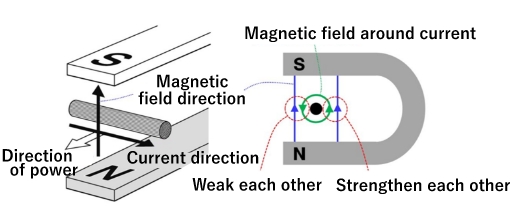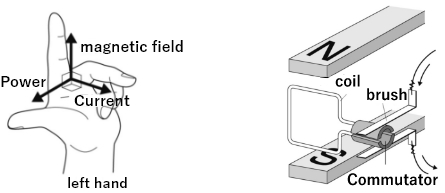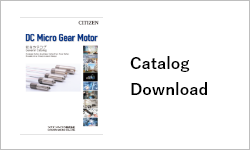What is a DC Motor?
Motors are classified into various types according to their structure.
・Direct current motor (DC motor)
・Alternating current motor (AC motor)
・Stepper motor
Among them, a DC motor is a motor that runs on a DC power supply, that is, a battery such as a dry cell.
Citizen Micro's products (DC motors, gear heads, encoders) have a lineup of small-sized (φ40 mm or less) motors based on the ultra-precision processing technology cultivated in the manufacture of wristwatch parts.
・Cored DC motor
・Coreless DC motor
・Brushless DC motor
DC Motor Principle
A motor is a device that converts electricity into power, also called an electric motor, which generates mechanical energy (rotational force) from electrical energy using permanent magnets and electric wires.
To explain the principle of a motor requires knowledge of the forces that work between the magnetic field and the current. The magnetic field generated by a permanent magnet is directed from the N pole to the S pole, and a mechanical force (F) is generated when current (I) flows through an electric wire placed across the magnetic field (B). This is the principle of how a motor works.

The strength of the force generated by this principle is expressed by the following formula and is called the BLI law. The actual torque of a motor is a complicated formula because it uses multiple wires, but it is basically calculated by these principles and formulas.
F=BLI
F:Force
B:Magnetic flux density
L:Length of wire in magnetic field
I:Current
The direction of this force is determined by Fleming's left-hand rule, which is the thumb of the left hand (F: Direction of force), the index finger (B: Direction of magnetic flux), and the middle finger (I: Direction of current).
A motor is a device with a structure devised to continuously generate (rotate) torque using these principles by switching according to rotation using multiple electric wires, commutators, and brushes.

Various speed gearheads we designed and manufactured and an extensive lineup of motor products equipped with rotary encoders are used in various fields that require miniaturization, such as medical care, industry, optics, robots and more. We also propose customized products (small motor units, etc.) jointly developed to meet customer needs, so please feel free to contact our sales staff.






